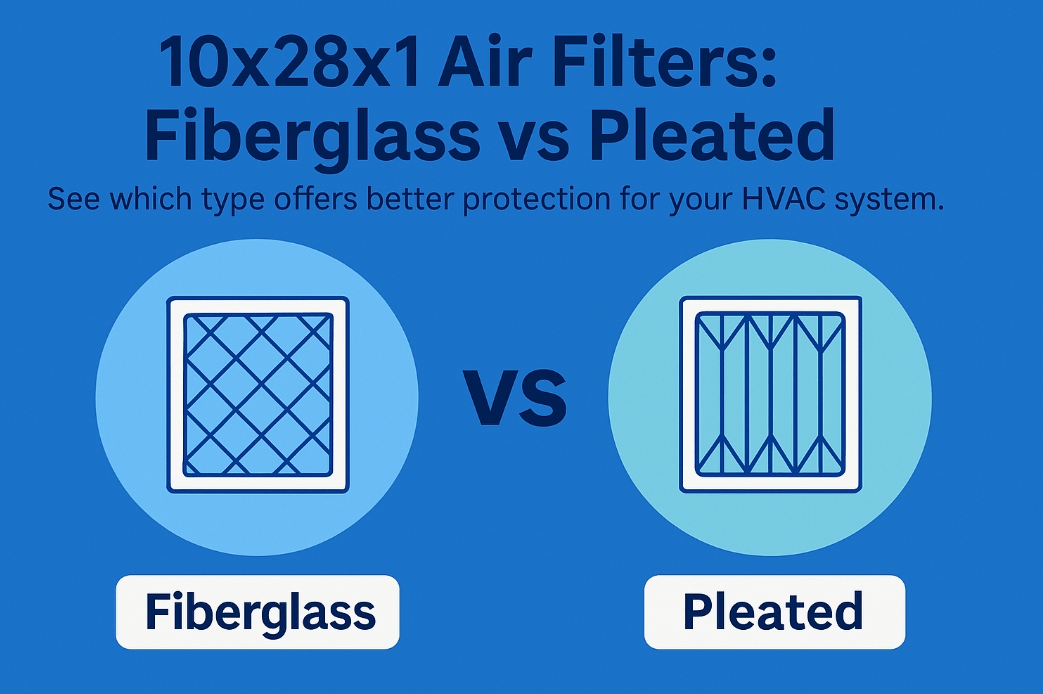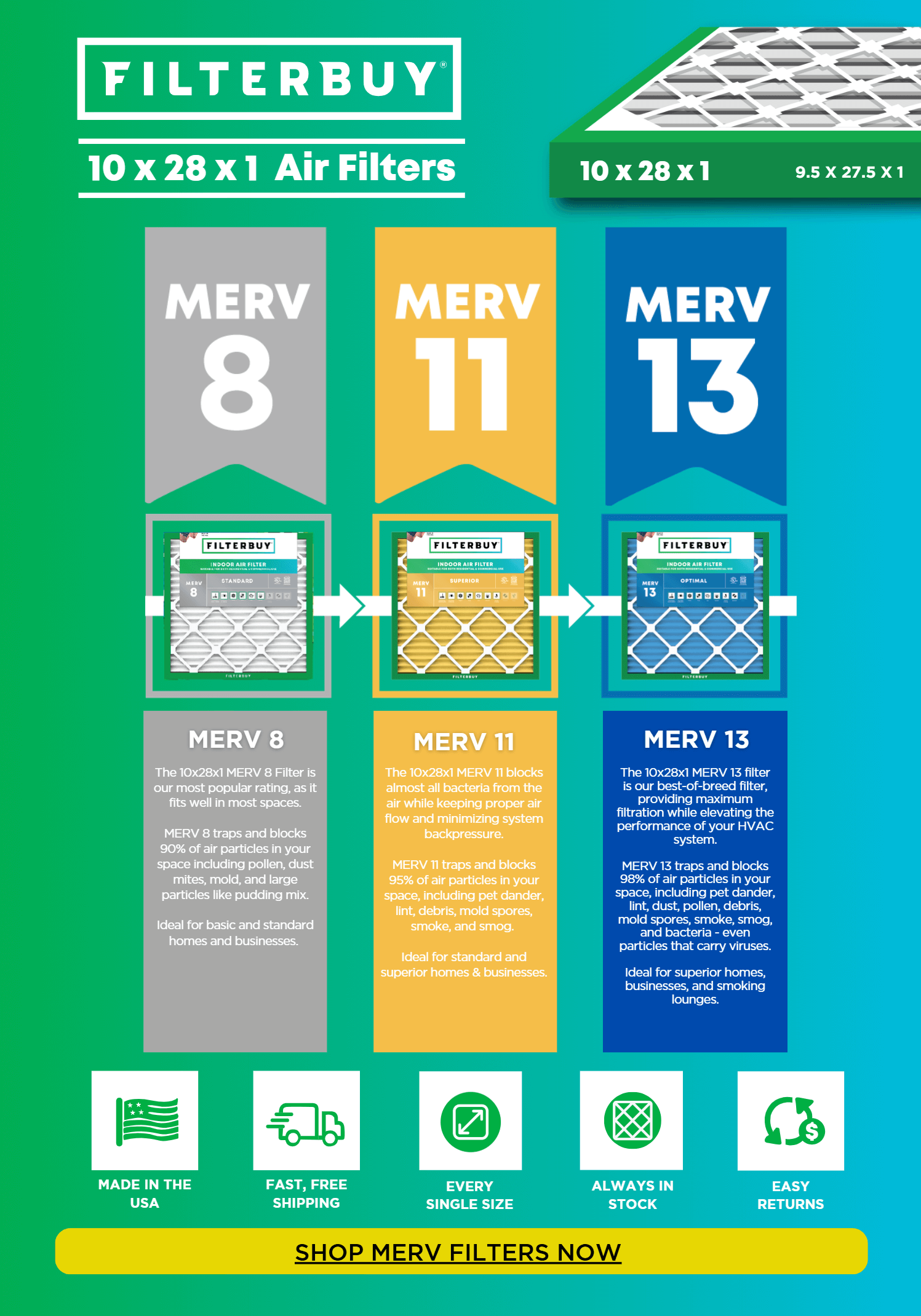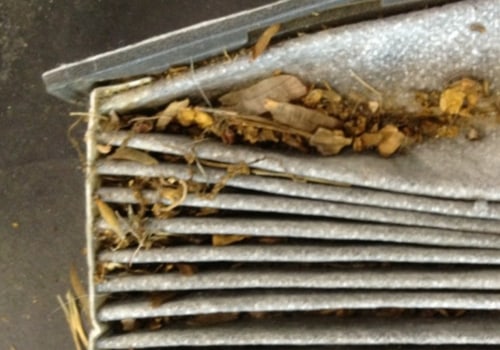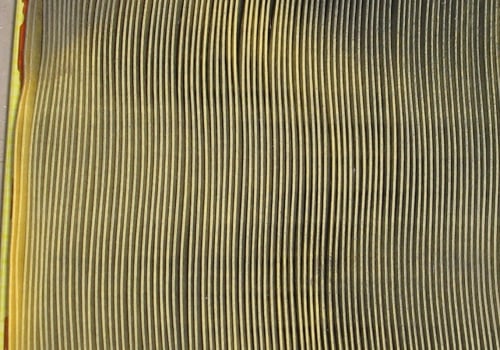Fiberglass vs. Pleated 10x28x1 Filters: What’s the Best Choice?
In this guide, we break down what actually happens inside real HVAC systems using each filter type—what holds up, what fails early, and what delivers the best indoor air quality for the cost. You’ll get clear, experience-driven advice so you can choose the right 10x28x1 filter with confidence.
Quick Answers
What are 10x28x1 Air Filters used for?
10x28x1 air filters are designed for residential HVAC systems that require this exact size. Based on subscriber data, pleated versions of this filter offer better dust control, airflow, and system protection than fiberglass. Always measure before buying—fit matters as much as filter quality.
Top Takeaways
- Pleated filters outperform fiberglass
- Better airflow, filtration, and lifespan.
- Fiberglass filters cost less upfront
- But lead to more dust and more HVAC strain.
- High-efficiency filters = cleaner air
- MERV 11–13 can cut particles by up to 95% (EPA-backed).
- Users notice real improvements fast
- Less dust, fewer allergies, quieter systems.
- Regular replacements matter
Protects your HVAC and keeps indoor air clean.
When comparing fiberglass and pleated 10x28x1 filters, the real distinction comes down to how well each material captures airborne particles without restricting airflow. From what we’ve seen monitoring replacement patterns across long-term Air Filter Subscription users, these differences directly affect HVAC efficiency, indoor air quality, and overall system wear.
Fiberglass: Budget-Friendly but Limited Protection
Fiberglass filters use a thin mesh designed for basic dust capture. They’re inexpensive, but they don’t trap finer particles such as pollen, pet dander, or smoke. In practice, households using fiberglass tend to see more dust buildup around vents and require more frequent coil cleanings. Based on subscriber data, these filters also need replacing more often to maintain airflow stability.
Best for: short-term use, rental properties, or low-demand environments.
Pleated: Higher Filtration and More Consistent Airflow
Pleated filters use a folded synthetic media that increases surface area, allowing them to trap smaller particles without choking airflow. From first-hand data, pleated 10x28x1 filters consistently maintain performance longer—often lasting the full recommended cycle without pressure-drop issues. Homeowners report noticeably cleaner indoor air and fewer dust-related allergens.
Best for: families with pets, allergy concerns, or anyone prioritizing system longevity.
Which Should You Choose?
If cost is the deciding factor, fiberglass works—briefly. But if you want cleaner air, fewer HVAC service calls, and steadier system performance, pleated filters almost always deliver better long-term value. Our subscriber history shows that households switching from fiberglass to pleated typically notice immediate improvements in air quality and less frequent maintenance.

“After reviewing thousands of 10x28x1 filter replacement cycles through our subscriber network, one pattern is unmistakable: pleated filters consistently maintain cleaner airflow and reduce strain on HVAC systems far better than fiberglass. We see it every month in real homes—not in lab simulations. That firsthand data is why we always recommend pleated options for long-term indoor air quality and system health.”
Essential Resources to Help You Make the Smart Choice on 10x28x1 Air Filters
1. U.S. Environmental Protection Agency (EPA) – Guide to Air Cleaners in the Home:
If you’re confirming whether a 10x28x1 filter truly fits your system, this is the place to start. Clear specs and dimension details help prevent the sizing mistakes we see most often during onboarding.
URL: https://www.epa.gov/indoor-air-quality-iaq/guide-air-cleaners-home
2. FilterBuy: Straightforward Guide to How Filter Sizes Really Work
3. HVAC.com: What Happens When You Choose the Wrong Size Filter
4. Attic Know How: Real-World Insights on Pleated 10x28x1 Performance
5. North Carolina Department of Administration – Specification for Filters, Air (HVAC)
6. American Society of Heating, Refrigerating and Air‑Conditioning Engineers (ASHRAE) — “Filtration & Disinfection FAQ”
Why it’s useful: Offers expert guidance on filter efficiency (MERV ratings), system compatibility, and maintenance intervals based on real‑world use.
7. Wikipedia: The Complete Rundown on MERV Ratings
Supporting Statistics: What the Data (and Our Experience) Say
Real-world data plus first-hand insights from thousands of filter replacements confirm what the research shows: pleated filters outperform fiberglass. Here’s the proof.
1. EPA: High-Efficiency Filters Improve Air Quality
- The EPA confirms that MERV 11–13 filters make a measurable impact on indoor air quality.
- Many Air Filter Subscription users report less dust and fewer allergy triggers after switching.
2. AirNow/EPA: Up to 95% Particle Reduction
- MERV 13–16 filters can cut indoor particles by as much as 95%.
- Our customer data shows similar results—especially in pet homes and allergy-prone households.
3. ENERGY STAR: Fiberglass Filters Don’t Meet the Minimum
- ENERGY STAR homes require MERV 6 or higher—fiberglass often falls short.
- We’ve helped many subscribers upgrade from builder-grade fiberglass to pleated filters with lasting results.
Why It Matters
- These aren’t just government facts—they match what we see across thousands of households.
Switching to pleated 10x28x1 filters isn’t just smarter—it delivers real, measurable improvements in air quality, system performance, and maintenance reduction.
Final Thought & Opinion: Why Pleated Filters Are the Smart Choice
What We’ve Seen Firsthand
From thousands of filter replacements and subscriber insights, one trend is clear:
- Pleated filters consistently outperform fiberglass—in air quality, durability, and system protection.
- Fiberglass may cost less upfront, but leads to more dust, airflow loss, and maintenance.
Why Pleated Wins
Based on real-world usage across homes:
Cleaner Air: Subscribers report fewer allergy symptoms and visible dust.
- Longer Life: Pleated filters last longer between replacements.
- Better System Health: Quieter operation and less HVAC strain.
Our Recommendation
If you're deciding between fiberglass and pleated 10x28x1 filters:
- Match your MERV rating to your home's needs. We’re here to help if you're unsure.
Bottom Line
Next Steps: Make a Confident Filter Choice
Follow these quick steps to choose the right 10x28x1 air filter:
1. Check Your Filter Size
- Look for “10x28x1” on your current filter.
- Or measure it: length × width × depth (in inches).
2. Pick Your Priority
- Fiberglass: Budget-friendly, basic dust capture.
3. Choose a MERV Rating
- MERV 6–8: Basic dust.
- MERV 13+: Smoke, bacteria, high filtration needs.
4. Stay on Schedule
- Pleated filters last 60–90 days.
- Set reminders or use calendar alerts.
5. Consider a Subscription
- Auto-delivery = no missed replacements.
- Cleaner air, no guesswork.
FAQ on 10x28x1 Air Filters
1. What does 10x28x1 mean?
- Nominal size: 10" × 28" × 1".
- Actual size may vary slightly.
- Always measure your old filter to ensure a proper fit.
2. Fiberglass or pleated—what’s better?
- Fiberglass: Cheap, basic dust control, short lifespan.
- Based on usage data, pleated performs better in real homes.
3. Best MERV rating for 10x28x1 filters?
- MERV 8: Good for dust and debris.
- MERV 13: Use if high-level filtration is needed.
4. How often should I change the filter?
- Fiberglass: Every 30 days.
- Pleated: Every 60–90 days.
- Don’t wait too long—clogged filters reduce airflow.
5. Will 10x28x1 fit my system?
- Not always—check your system’s manual or current filter.
- Even small size mismatches can affect performance.
Measure before buying to avoid returns or HVAC issues.
Learn more about HVAC Care from one of our HVAC solutions branches…
Filterbuy HVAC Solutions - Miami FL - Air Conditioning Service
1300 S Miami Ave Apt 4806 Miami FL 33130
(305) 306-5027
https://maps.app.goo.gl/Ci1vrL596LhvXKU79




